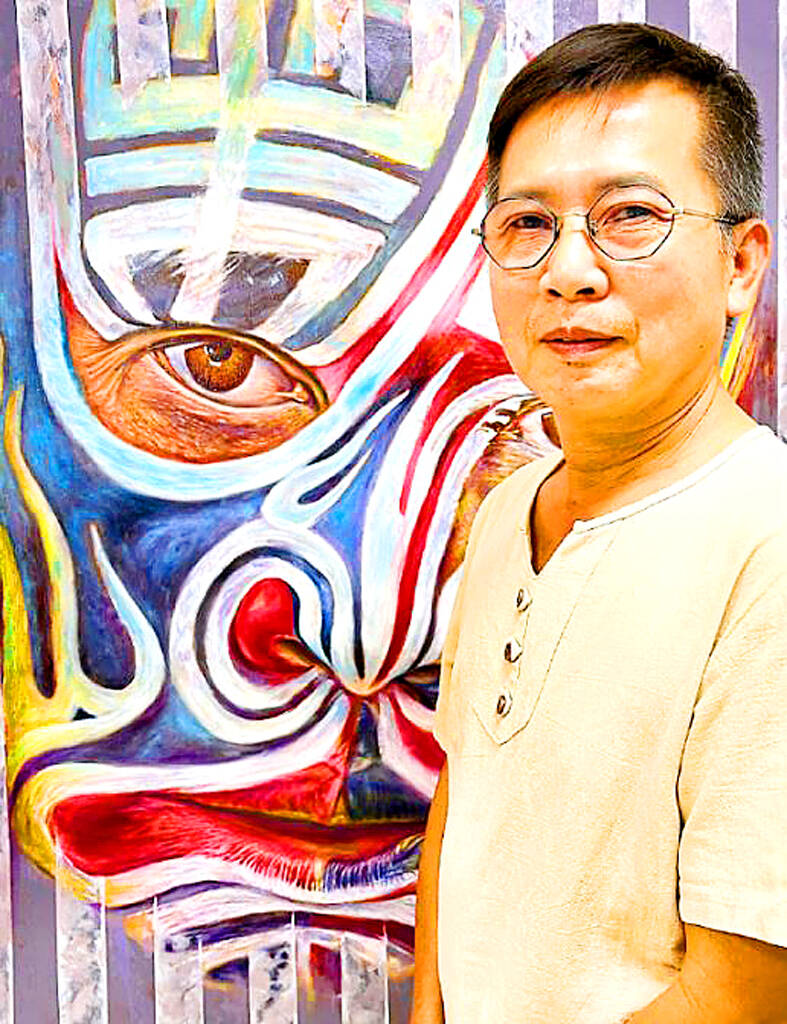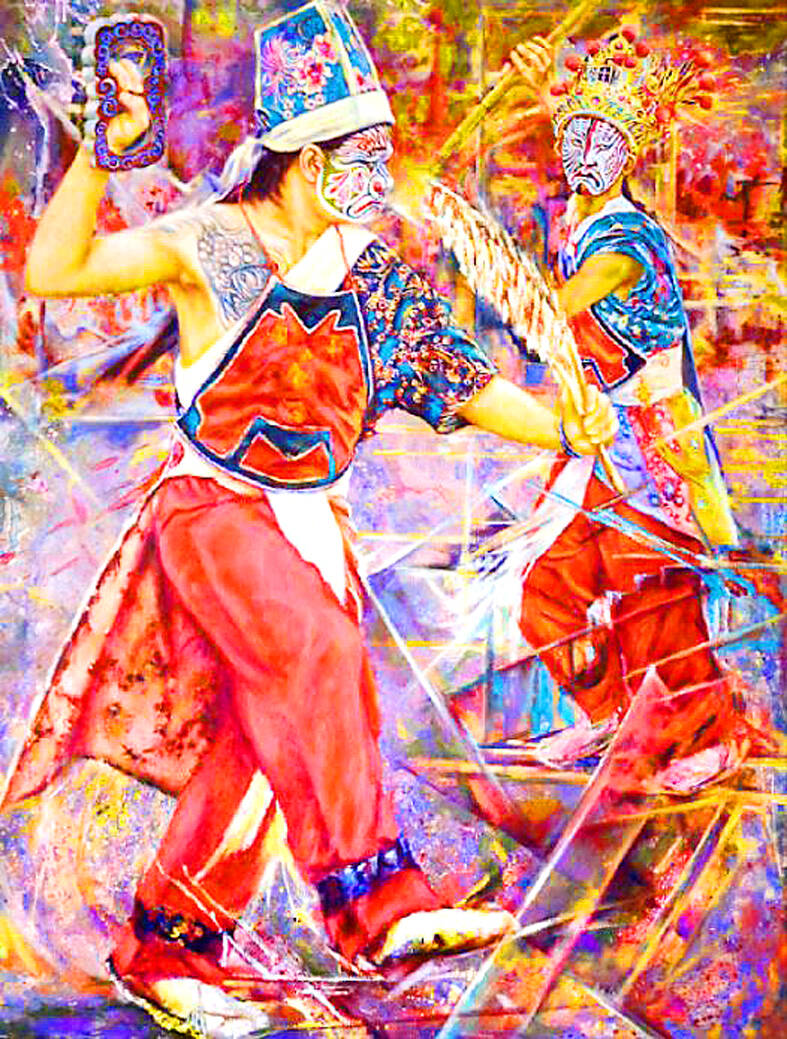Taiwanese art must beat its own path by exploring native culture and lived experiences to stand out on the global stage of fine arts, said Jhuang Jian-yu (莊洊有), an oil painter whose creations revolve around the ceremonial Dance of the Eight Generals.
Born in 1961 to a blue-collar family, Jhuang said he harbored artistic aspirations, but did not have the opportunity to receive a formal fine arts education, as his family elders vehemently opposed his dreams.
Jhuang’s father believed that art did not lead to a career and would beat Jhuang whenever he was caught drawing pictures, he said, adding that he learned to doodle furtively.

Photo: Kao I-fen, Taipei Times
By the age of 16, Jhuang began working to support his family after failing to graduate from the electronic engineering program at his vocational high school, as he was not interested in the subject and had no money to pay for tuition, he said.
For the next two decades, Jhuang worked and raised a family of his own while reading literature and philosophy in his free time, he said.
He picked up the brush in 2000 after the last of the family elders he supported passed away, Jhuang said, adding that he painted mainly landscapes and portraits during that time.

Photo courtesy of Jhuang Jian-yu
In 2007, Jhuang had a conversation with renowned ink painter Hung Ken-shan (洪根深) in which the latter told him that his paintings did not possess the originality that distinguishes an artist from their peers, he said.
Realizing that creating landscapes and portraits which any other artist can duplicate is futile, Jhuang burned his old paintings and then immersed himself in Western art history and theory, he said.
Studying the rise of new artistic styles in history gave him an insight: He had to look into his native culture if he wanted to create paintings that bear an unmistakable personal stamp, Jhuang said.
While Jhuang searched for inspiration, he found out that his son was secretly visiting a local temple to learn the Dance of the Eight Generals, apparently fearing his disapproval, he said.
Instead of scolding his son, Jhuang asked for permission to observe the dance troupe at the temple and soon began making paintings about the subject, he said.
Between 2012 and 2015, Jhuang created about 50 oil paintings on the traditional Taiwanese ritual, which were exhibited at art galleries and later published in an art book entitled Taiwan: Glimmering Grassroots (台灣草根微光), he said.
THE EIGHT GENERALS
In Taiwanese folklore, the Eight Generals are the household guards of the temple’s god and the ceremonial dance is a ritual to banish evil spirits and disease in the communities around the temple, Jhuang said.
Despite its unearned label of lacking cultural merit, the ritual dance is a solemn and beautiful performance that serves a vital function to the nation’s living religious tradition, he said, adding that the art form is as worthy of respect as Beijing opera, which is beloved by high-culture people.
By participating in the ritual, most temple troupe members, in addition to having an opportunity to display their piety, receive respect and obtain a sense of achievement, which are often denied to people of their circumstances, he said.
The Glimmering Grassroots paintings comprise the first phase of his Eight-Generals-inspired art creations, he said.
The subject of these pieces was not the temple dance it ostensibly portrays, but an exploration of the human relationship with the divine and its mediation through society, Jhuang said.
The second phase of Jhuang’s paintings is distinguished by the presence of a female nude in the composition, he said.
The nudes from that phase of Jhuang’s work — which notably took an abstract turn — were juxtaposed against the disembodied visage of an Eight-General dancer looming large in the void.
Jhuang defended the use of nudity in his painting, saying that unclothed figures routinely appear in Western art and that their use in his paintings about Taiwanese religion was a deliberate jab.
The nude figures in this series represent the faithful who must bare their soul and desires before the gods when they supplicate for a deity’s blessing, he said.
The ambitious politicians and the greedy, too, are participants in Taiwan’s religious folk practices and play a role in shaping religion, he said, adding that he aimed to reveal the complex relationship between society and religion, rather than pass judgement.
TWO SERIES
His latest paintings are comprised of two series: One which revolves around a play with the five elements that comprise the universe and human beings in traditional cosmology, and the other portraying men wearing Eight-Generals makeup and foreign garments, Jhuang said.
The former carries an explicit message for the audience to take better care of the environment and their souls, while the latter affirms Taiwan’s increasing cultural pluralism, he said.

Prosecutors in New Taipei City yesterday indicted 31 individuals affiliated with the Chinese Nationalist Party (KMT) for allegedly forging thousands of signatures in recall campaigns targeting three Democratic Progressive Party (DPP) lawmakers. The indictments stem from investigations launched earlier this year after DPP lawmakers Su Chiao-hui (蘇巧慧) and Lee Kuen-cheng (李坤城) filed criminal complaints accusing campaign organizers of submitting false signatures in recall petitions against them. According to the New Taipei District Prosecutors Office, a total of 2,566 forged recall proposal forms in the initial proposer petition were found during the probe. Among those

ECHOVIRUS 11: The rate of enterovirus infections in northern Taiwan increased last week, with a four-year-old girl developing acute flaccid paralysis, the CDC said Two imported cases of chikungunya fever were reported last week, raising the total this year to 13 cases — the most for the same period in 18 years, the Centers for Disease Control (CDC) said yesterday. The two cases were a Taiwanese and a foreign national who both arrived from Indonesia, CDC Epidemic Intelligence Center Deputy Director Lee Chia-lin (李佳琳) said. The 13 cases reported this year are the most for the same period since chikungunya was added to the list of notifiable communicable diseases in October 2007, she said, adding that all the cases this year were imported, including 11 from

China might accelerate its strategic actions toward Taiwan, the South China Sea and across the first island chain, after the US officially entered a military conflict with Iran, as Beijing would perceive Washington as incapable of fighting a two-front war, a military expert said yesterday. The US’ ongoing conflict with Iran is not merely an act of retaliation or a “delaying tactic,” but a strategic military campaign aimed at dismantling Tehran’s nuclear capabilities and reshaping the regional order in the Middle East, said National Defense University distinguished adjunct lecturer Holmes Liao (廖宏祥), former McDonnell Douglas Aerospace representative in Taiwan. If

The Mainland Affairs Council (MAC) today condemned the Chinese Communist Party (CCP) after the Czech officials confirmed that Chinese agents had surveilled Vice President Hsiao Bi-khim (蕭美琴) during her visit to Prague in March last year. Czech Military Intelligence director Petr Bartovsky yesterday said that Chinese operatives had attempted to create the conditions to carry out a demonstrative incident involving Hsiao, going as far as to plan a collision with her car. Hsiao was vice president-elect at the time. The MAC said that it has requested an explanation and demanded a public apology from Beijing. The CCP has repeatedly ignored the desires